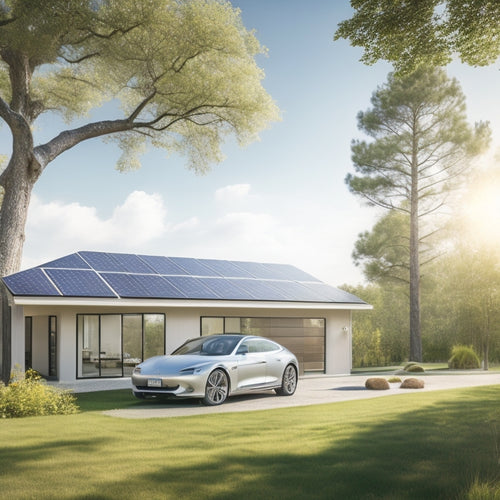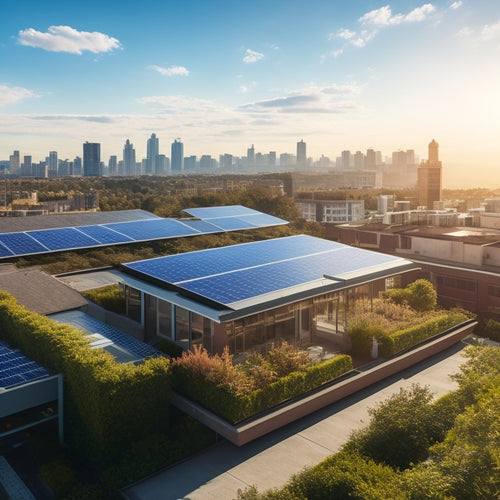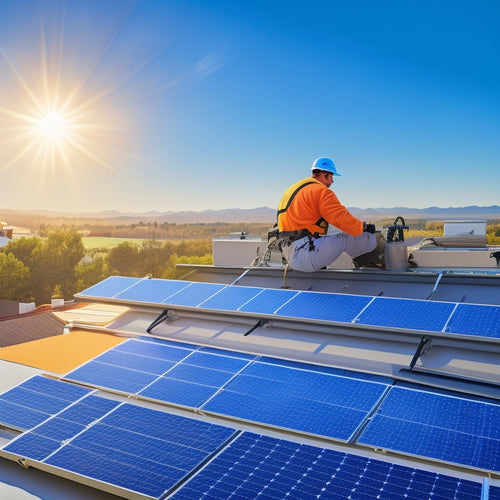
Best Solar Panel Systems for Home
Share
When selecting the best solar panel system for your home, you want top-rated brands that prioritize innovation, quality, and sustainability. With total installation costs ranging from $15,000 to $30,000 or more, understanding the costs and incentives is essential. High-efficiency solar panels like SunPower X-Series, Panasonic HIT-240, and LG NeON 2 maximize energy yield, ideal for homes with limited roof space or high energy demands. You'll also need to evaluate the best solar inverters, installation process, and maintenance essentials to optimize performance. By digging deeper into these factors, you'll be well-equipped to make an informed decision that suits your energy needs and budget.
Key Takeaways
- High-efficiency solar panels with ratings above 20% maximize energy yield and are ideal for homes with limited roof space or high energy demands.
- Top-rated solar panel brands prioritize research, development, and high-quality materials for superior performance, durability, and reliability.
- The total installation cost of a solar panel system ranges from $15,000 to $30,000 or more, but federal and state incentives can reduce costs.
- Pairing solar panels with energy storage solutions enhances reliability and efficiency, and high-efficiency inverters (>95%) minimize energy losses.
- Regular maintenance, including monthly visual inspections and quarterly cleaning, is essential to maximize energy output and extend system lifespan.
Top-Rated Solar Panel Brands
What sets top-rated solar panel brands apart from the rest? You're about to invest in a solar panel system for your home, and you want to know what makes the best brands stand out from the rest.
Top-rated solar panel brands are distinguished by their commitment to solar panel innovations and sustainable materials. These brands prioritize research and development, continually pushing the boundaries of solar panel technology to increase efficiency and reduce environmental impact.
They use high-quality, sustainable materials that minimize waste and guarantee a longer lifespan for their products.
When you choose a top-rated solar panel brand, you can expect superior performance, durability, and reliability. These brands offer extensive warranties, dedicated customer support, and transparent product information.
They also prioritize compliance with industry standards and regulations, giving you peace of mind that your solar panel system meets the highest standards of quality and safety.
Residential Solar Panel Costs
Now that you've selected a top-rated solar panel brand, it's time to contemplate the costs associated with installing a residential solar panel system. The overall cost includes the solar panels, inverters, mounting hardware, and installation labor. On average, the total cost ranges from $15,000 to $30,000 or more, depending on the system size and quality.
To make solar energy more accessible, there are various financing options and installation incentives available. Here's a breakdown of the typical costs and incentives:
| Cost/Incentive | Details |
|---|---|
| System Cost | $15,000 to $30,000 or more |
| Federal Tax Credit | 26% of total system cost |
| State and Local Incentives | Varying amounts, depending on location |
Financing options, such as loans and power purchase agreements, can help spread the initial cost over time. Additionally, many states and local governments offer incentives, such as rebates and tax credits, to encourage the adoption of solar energy. By understanding these costs and incentives, you can make an informed decision about investing in a residential solar panel system.
High-Efficiency Solar Panels
When you're shopping for high-efficiency solar panels, you're looking for maximum power output per unit area.
This is essential since it directly impacts your energy harvesting capacity, and therefore, your overall energy independence.
You'll want to take into account panels with high-efficiency ratings, typically above 20%, to maximize your energy yield.
Maximum Power Output
High-efficiency solar panels, boasting maximum power output, are the crème de la crème of solar technology. When you're looking for a solar panel system that can deliver the most power per hour of sunlight, high-efficiency panels are the way to go. These panels are designed to maximize energy production, making them ideal for homes with limited roof space or high energy demands.
Here's a comparison of some top high-efficiency solar panels:
| Model | Maximum Power Output (Watts) |
|---|---|
| SunPower X-Series | 440 |
| Panasonic HIT-240 | 410 |
| LG NeON 2 | 390 |
| Trina Solar TALLMAX M10 | 385 |
| Hanwha Q CELLS Q.PEAK DUO | 380 |
These high-efficiency solar panels are perfect for homeowners who want to optimize their energy production and reduce their carbon footprint. When paired with advanced energy storage solutions, you can enjoy a reliable and efficient source of renewable energy. By choosing a high-efficiency solar panel system, you'll be able to generate more power and save more money on your energy bills.
Energy Harvesting Capacity
How much energy can high-efficiency solar panels actually harvest from the sun? The answer lies in their energy conversion capabilities. You see, high-efficiency solar panels are designed to maximize energy harvesting capacity, converting a higher percentage of sunlight into electrical energy.
Here's what you need to know:
-
Higher efficiency ratings: High-efficiency solar panels boast higher efficiency ratings, typically above 20%. This means they can convert more sunlight into electrical energy, giving you more power per hour of sunlight.
-
Advanced solar technologies: These panels often employ advanced solar technologies, such as bifacial panels or perovskite cells, which enable better energy conversion.
-
Optimized panel design: High-efficiency solar panels are designed to optimize energy harvesting, with features like larger cells, thinner wires, and improved reflective materials.
- Maximum power output: By maximizing energy harvesting capacity, high-efficiency solar panels can generate more power per unit area, making them ideal for homes with limited roof space.
When it comes to energy harvesting capacity, high-efficiency solar panels are the clear winners.
Best Solar Inverters for Homes
As you contemplate shifting to solar power, you'll need a reliable inverter to convert the DC energy generated by your panels into usable AC power for your home. Inverters play a vital role in guaranteeing a smooth and efficient energy supply. When selecting an inverter, you'll encounter various solar inverter types, each with its unique characteristics.
| Inverter Type | Description |
|---|---|
| String Inverters | Most common type, suitable for small to medium-sized systems, with a single inverter for multiple panels |
| Microinverters | Individual inverters for each panel, ideal for systems with partial shading or complex roof layouts |
| Power Optimizers | A combination of string inverters and microinverters, offering a balance between cost and performance |
Inverter efficiency is another important factor to take into account. Look for inverters with high efficiency ratings (>95%) to minimize energy losses. A high-efficiency inverter can greatly impact your overall energy savings. When choosing an inverter, verify it's compatible with your solar panel system and meets your energy requirements.
Solar Panel Installation Process
With your solar panel system and inverter selected, it's time to bring it all together through a seamless installation process.
The installation process involves several essential steps that guarantee a safe, efficient, and reliable system.
-
Site Assessment: A thorough site assessment is conducted to evaluate your roof's suitability for solar panels, considering factors such as size, orientation, and shading.
-
Permitting Process: The contractor obtains necessary permits and approvals from local authorities, guaranteeing compliance with regulations and safety standards.
-
Installation Techniques: Skilled technicians employ advanced installation techniques, guaranteeing a secure and weather-tight installation that meets manufacturer specifications.
- Grid Connection: The system is connected to the grid, allowing you to feed excess energy back to the utility company and offset your energy bills.
Throughout the process, your chosen contractor will take care of everything, from guaranteeing safety measures are in place to meeting inspection requirements.
Be sure to discuss financing options and the installation timeline with your contractor to guarantee a smooth and hassle-free experience.
Factors Affecting Solar Efficiency
When you're considering a solar panel system for your home, you'll want to optimize its efficiency to maximize energy production.
You'll find that two key factors affect your system's performance: the angle at which your panels are installed and any potential shading issues on your property.
Panel Angle Matters
About 30% of solar panel efficiency is lost due to improper panel angle installation. You might think it's just a matter of slapping the panels on your roof and calling it a day, but the angle at which they're installed can make a significant difference in energy production.
To enhance your solar panel system's performance, consider the following factors:
-
Ideal tilt: The best angle for your solar panels depends on your location and roof orientation. A tilt between 30-40 degrees is usually best for maximum energy production.
-
Seasonal adjustments: As the seasons change, the sun's position in the sky shifts. Making seasonal adjustments to your panel angle can guarantee you're getting the most sunlight exposure possible.
-
Solar tracking: If you want to get really precise, consider investing in a solar tracking system. This technology allows your panels to adjust their angle throughout the day to maximize energy production.
- Installation angles: Even if you can't make adjustments, choosing the right installation angle during setup can still make a big difference. Consult with a professional to determine the best angle for your roof and location.
Shading Reduces Output
Shading is a major performance thief, and even slight obstructions can greatly reduce your solar panel system's energy output. As you consider installing solar panels, it's vital to assess the shading impacts on your roof.
Shading from trees, buildings, or other obstructions can greatly decrease your system's energy production. For instance, a small branch casting a shadow on a single panel can reduce the entire system's output by up to 20%.
To mitigate shading impacts, you can employ shading solutions such as trimming trees, installing panels at an angle to minimize shading, or using specialized equipment like bypass diodes or optimizers.
These solutions can help maximize your system's energy output, even in partially shaded conditions. When evaluating your roof for solar panels, it's important to identify potential shading areas and develop a strategy to overcome them.
Top Solar Panel Models Reviewed
Five top-tier solar panel models stand out from the rest, offering exceptional efficiency, durability, and performance for your home. When selecting the best solar panel system, it's crucial to evaluate the latest advancements in solar panel technology and current installation trends.
Here are the top solar panel models reviewed:
-
Tesla Solar Roof: Integrates seamlessly into your roofing system, offering a sleek, modern design and high-efficiency energy production.
-
Panasonic HIT-240: Boasts an impressive 21.8% efficiency rating, making it an excellent choice for homeowners with limited roof space.
-
SunPower X-Series: Features a maximum efficiency of 22.8%, ensuring you get the most power from your solar panel system.
- LG Solar NeON 2: Offers a 20.5% efficiency rating and a sleek, black design that complements any roof style.
These top-rated solar panel models provide the perfect blend of performance, durability, and style for your home.
Solar Panel Maintenance Tips
Your solar panel system is a significant investment, and proper maintenance is crucial to confirm it operates at peak levels. Regular maintenance not only guarantees peak energy production but also extends the lifespan of your system.
| Activity | Frequency | Purpose |
|---|---|---|
| Visual inspections | Monthly | Identify loose connections, damaged panels, or signs of wear |
| Cleaning | Quarterly | Remove dirt, debris, and other obstructions that reduce energy output |
| Seasonal inspections | Semi-annually | Check for seasonal-specific issues, such as snow or leaf buildup |
Use gentle cleaning techniques to avoid damaging your panels. Avoid using harsh chemicals, abrasive materials, or high-pressure washes. Instead, opt for soft-bristled brushes, mild soap, and distilled water. For seasonal inspections, inspect your system for signs of wear, corrosion, or damage. Check for loose connections, and confirm that all components are securely fastened. By following these maintenance tips, you'll be able to maximize your energy output, reduce repair costs, and enjoy a longer system lifespan.
Benefits of Solar Energy Systems
By utilizing the power of the sun, you can reap numerous benefits from installing a solar energy system on your property. Not only will you reduce your reliance on the grid, but you'll also contribute to a cleaner environment.
Here are four key advantages of solar energy systems:
-
Environmental Impact: Solar energy is a renewable resource, producing zero emissions or pollution, making it a cleaner alternative to traditional fossil fuels.
-
Energy Independence: With a solar energy system, you'll generate your own electricity, reducing your reliance on the grid and providing energy security.
-
Cost Savings: Solar energy can greatly reduce your energy bills, especially with government incentives and declining technology costs.
- Grid Stability: By generating your own electricity, you'll reduce the strain on the grid, promoting grid stability and contributing to a more sustainable energy future.
As technological advancements continue to improve efficiency and affordability, now is an ideal time to invest in a solar energy system.
Solar Panel Warranty Comparison
When evaluating solar panel systems, you'll want to compare the warranty terms of different manufacturers.
Specifically, you should examine the product coverage period, which can range from 10 to 30 years, and the performance guarantee, which guarantees a minimum level of energy output over time.
Product Coverage Period
Among the essential factors to contemplate when evaluating solar panel systems is the product coverage period, which encompasses the warranty and guarantee offered by manufacturers.
This period is critical as it directly affects the product lifespan and your overall investment. You want to verify the manufacturer stands behind their product, providing you with peace of mind and financial protection.
When comparing solar panel systems, consider the following product coverage period aspects:
-
Warranty duration: Look for manufacturers that offer a minimum of 25-year warranty coverage for their solar panels.
-
Coverage options: Check if the warranty covers repairs, replacements, and maintenance costs.
-
Performance degradation: Ascertain the warranty accounts for performance degradation over time, ensuring a certain level of energy output.
- Extended warranty options: Find out if manufacturers offer extended warranty options, providing additional protection beyond the standard warranty period.
Performance Guarantee
As you investigate deeper into the world of solar panel systems, understanding the performance guarantee becomes crucial. This guarantee affirms the system's ability to generate power at a certain level over its lifespan. You'll want to evaluate the performance guarantee offered by different manufacturers, as it greatly impacts the system's overall value.
There are two primary guarantee types: power output guarantee and annual degradation rate guarantee. The power output guarantee assures a minimum energy production level, typically 90% or higher, for a specified period. The annual degradation rate guarantee promises a maximum rate of power decline, usually around 0.5% per year.
Look for manufacturers offering a 25-year or longer performance guarantee, as this indicates confidence in their product's durability.
When comparing performance guarantees, examine the performance metrics, such as the guaranteed power output, annual degradation rate, and warranty duration. A thorough performance guarantee provides peace of mind, affirming your solar panel system will generate power efficiently for years to come.
Be sure to carefully review the guarantee terms and conditions to make an informed decision.
Frequently Asked Questions
Can I Install Solar Panels on a Metal Roof?
You can install solar panels on a metal roof, but you'll need to take into account the type of metal roof you have, such as standing seam or corrugated, and make certain the installation is securely fastened to withstand wind and weather.
How Often Should I Clean My Solar Panels?
As you bask in the radiant glow of your solar panel's energy, remember to dust off the cobwebs every 6-12 months, ensuring peak performance; a clean slate for your solar panel maintenance, where frequency is key to utilizing maximum power.
Do Solar Panels Work During a Power Outage?
During a power outage, you'll still generate electricity with solar panels, but they won't supply your home without a battery backup or grid-tie inverter. Invest in power outage solutions to maintain peak solar panel efficiency and guarantee continuous energy supply.
Can I Add More Panels to My Existing System?
A million possibilities open up when you consider solar panel expansion! You can definitely add more panels to your existing system, but first, verify system compatibility by checking your inverter's capacity and panel matchability to avoid any hiccups.
Will Solar Panels Increase My Property Taxes?
You're wondering if solar panels will increase your property taxes; fortunately, in most states, solar panel assessments don't impact property tax implications, as the added value is often exempt or negligible, so you won't see a significant hike.
Related Posts
-

Why Invest in Solar Car Battery Chargers Online?
By investing in a solar car battery charger online, you're not only reducing your reliance on fossil fuels but also o...
-

What Is the Cost to Put in Solar Panels
You're likely considering solar panels for your home, and the most significant factor in your decision is the upfront...
-

3 Essential Steps for Solar Electricity Installation
To guarantee a successful solar electricity installation, you'll need to follow three essential steps. First, assess ...


